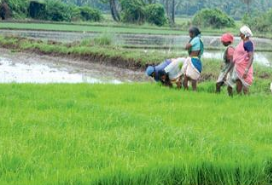Initiatives to reduce carbon emissions from Farming
Recognising the need to cut down on carbon emissions to tackle climate change, the government of India has taken the following steps to reduce the emissions from the farm sector:
- Crop diversification programme under Rashtriya Krishi Vikas Yojana (RKVY), National Food Security Mission (NFSM) and Bringing Green Revolution to Eastern India (BGREI).
- Increasing the area under System of Rice Intensification (SRI) as an alternative to the widely used practice of transplanted paddy.
- Deployment of zero tillage drill machines and other residue management equipment to enable planting of Rabi crop in the standing residue of rice crop to avoid stubble burning.
- Adopting the practices like alternate wetting and drying, direct seeded rice system of rice cultivation, use of slow-release nitrogen fertilizers, integrated nutrient management practices, leaf colour chart-based nitrogen application, use of urea super granules etc in rice cultivation.
- Neem coating of urea.
- Planting of trees under National Food Security Mission (NFSM), Bringing Green Revolution to Eastern India (BGREI), Sub-Mission on Agro-Forestry (SMAF) and National Bamboo Mission (NBM).
- Spreading of micro irrigation under Pradhan Mantri Krishi Sinchai Yojana (PMKSY)-Per Drop More Crop
- Models of Integrated Farming System (IFS) have been developed for replication in Krishi Vigyan Kendras (KVKs) and in the States for enabling climate-resilient agriculture and cutting down the carbon emissions.
Together with above initiatives, various sub-programmes initiated by government like Soil Health Card (SHC), Paramparagat Krishi Vikas Yojana (PKVY), Mission Organic for Value Chain Development for North East (MOVCD), Rainfed Area Development (RAD), Sub-Mission on Agroforestry (SMAF) and National Bamboo Mission (NBM) are contributing towards cutting down of carbon emissions from farm sector.
Month: Current Affairs - January, 2019


